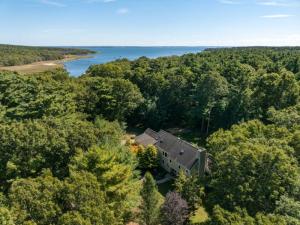Opinion: Defend Dartmouth from what?
To the editor:
George Marcotte, in his letter of March 17, gets both his history and his facts wrong.
In 2019 the Flag & Seal bill was refiled by members of the House and Senate — again, after 34 years of attempts by indigenous people and former state rep Byron Rushing. Another bill filed by elected legislators concerned mascots. In 2019 the state indigenous mascot ban legislation had been filed repeatedly. Meanwhile, the country was changing. NFL franchise names were changed, Land o' Lakes, Uncle Ben's, and Aunt Jemima had all ditched offensive symbols and names. And many people in Dartmouth had simply gotten up one morning and smelled the pancakes. It was the 21st Century after all, and it really was time for a change.
But in Mr. Marcotte's fevered imagination this must have ALL been the work of nefarious elites.
In August 2019, the NAACP and two residents of Dartmouth met with the School Committee during Summer recess and asked that the schools hold community hearings on the mascot. The NAACP even offered to moderate the discussions if that would help. At the time, our only purpose was to hold a thoughtful community conversation about a troubling symbol.
With surprising speed the School Committee, in a 3-2 vote, slapped that idea down, hoping that it — and we — would simply go away. Votes against were John Nunes, Chris Oliver, and Kathleen Amaral. Carol Karafotis and Shannon Jenkins voted to at least see what the community thought; that was apparently tantamount to "launching a crusade" in Mr. Marcotte's book.
Mr. Marcotte, through a fictional chronology mixed with a vicious personal attack on Dr. Jenkins, would have you believe that the only reluctantly-formed Equality and Diversity Committee was "handpicked."
And he may think his "diversity committee without diversity" slogan is clever and catchy, but in fact the diversity committee reflected a diversity not found in either the community at large or its schools. How many members of the School Committee are white? 100%. What is the percentage of white teachers? 98.4%. Now that's truly something without diversity.
But "handpicked?" the Diversity Committee was not. It reported to the full Committee, had only consultative status, and it had a one-year mandate. Its last, shining accomplishment was to hold the March 8 hearings — which opponents tried to derail — at which Dartmouth residents discovered that most indigenous tribes in the area despise the mascot. This seems to have really touched Mr. Marcotte's nerve, but it's only thanks to these efforts that we could all be disabused of the lie that "the mascot honors Native Americans" and "no Native Americans resent the mascot."
It is telling that the schools freely admit that Native American history is currently taught only in 3rd grade. When we paged through the school's website we didn't find much on indigenous history, but we did find an offensive AP History project that had students writing business plans to get more colonists to displace Native Americans. According to DESE, the staff in this 91% white community is 98.4% white. And now we have one of Mr. Marcotte's pals, an extremist school candidate, joining in "Defending Dartmouth?"
Defending it from what, exactly? The 21st Century?
THIS is what Dartmouth as a community is up against. Like it or not, several members of the committee — including Dr. Jenkins — have admirably tried to address diversity education and race, to make Dartmouth Schools a welcoming place for all students. Coming up with a more respectful mascot — at least having an honest conversation about it — must be a part of that.
Mr. Marcotte just can't understand that "the Wampanoags," as he calls them, consist of many tribes. The Aquinnah, who have lived continuously on Noepe (Martha's Vineyard) for 10,000 years, are but one tribe of the Wampanoag. The Aquinnah students who designed an "iteration" of the green Indian head, are members of a diaspora, many of whom live off-island. The design of a generic "Eastern Woodland Indian" does not purport to represent the Aquinnah. The name "Indians" does not refer solely to the Aquinnah. Why, then, is there such a rush to rob almost every other tribe and nation in the South Coast of a voice on the mascot?
Finally, much has been made of so-called "cancel culture" and "erasing" the mascot. "Indian" supporters would have you believe that a football mascot is the only way to honor indigenous people. Education on historic and contemporary Native Americans, not football symbols, is the proper way to honor people who lived here before us, and continue to live among us, adapting to the present just as we all do. Whether you regard it as nostalgic or insulting, Dartmouth's Indian head depicts a generic "Dead Indian" warrior and not the exciting diversity of people we heard from at the March 8 meeting. And if he truly deplores "erasure," he ought to be the first to recommend that students learn of the actual "erasure" of Native Americans by genocide and slavery.
This is why we support "An Act Relative to Celebrating and Teaching Native American Culture & History" (H.651 and S.382), which accompany S.2748 "Relative to Educator Diversity."
If Mr. Marcotte were more interested in actually promoting the remembrance of Native American contributions, he would be standing side-by-side with us supporting this legislation instead of mobilizing extremists to "defend" Dartmouth from multiculturalism and the 21st Century.
David Ehrens,
Dartmouth




























